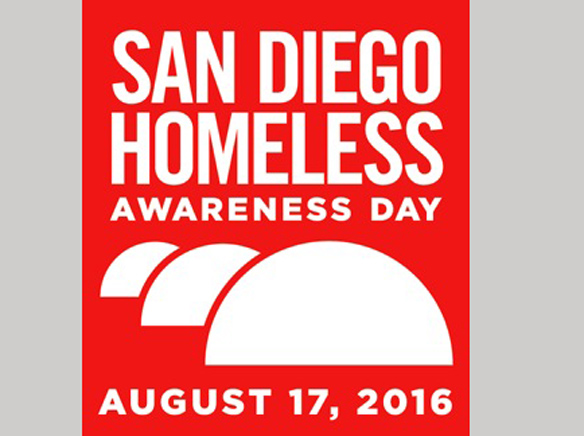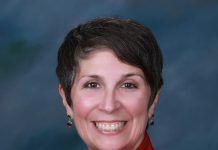They are startling facts. Domestic violence affects one in four women and one in seven men. One in five homicides in the San Diego County are the result of domestic violence. Eighty-three percent of all female homicides victims were murdered by a spouse, intimate partner or family member compared to 16 percent of male victims. Nearly 9,000 people experience homelessness in the county any night with 48 percent having no shelter. Fifty percent of homeless women and children are fleeing domestic violence. These are statistics that the YWCA San Diego County fights against every day, with every program it offers.
YWCA San Diego County Marketing & Development Director Gavon Morris said that the most common misconception about the homeless is around the subject of mental illness. In San Diego County the number of individuals in poverty is huge and the federal poverty threshold is very low.
“How can anyone in San Diego County live on that?” he said. “I believe there are a lot of individuals in the county that are just a little bit away from homelessness. Becoming homeless doesn’t take that much. And you have so many homeless people that want to change that around. But in a lot of ways, their hands are tied. Many times they are a larger family having to share a unit just to make ends meet. So someone dealing with some psychotic symptoms, speed, alcoholics—that is not always the case at all.”
Morris said the most important piece to the YWCA is the ability to serve as a resource for individuals in need and there are many differences of opinions in those populations. That is why it has focused programs like domestic violence. Fifty percent of women that are homeless attribute the cause of their homelessness to domestic violence.
“For us, the need is constant and there are not necessarily enough resources to do what we want to do,” he said. “So we have to focus on the people in our programs and strengthen those supportive services to get them what they need.”
The YWCA serves the homeless population and victims of domestic violence through three major programs.
Passages is for single homeless women. It is a 12 month program with transitional housing and supportive services. It provides financial literacy training, counseling, legal services and other needed elements with the focus on getting them back to work or improving their income in some capacity.
Cortez Hill Family Center is a 90 day interim shelter. There are 45 units where families are placed. The process is that they work through this program as a cohesive family. Many of these individuals come directly off the street, some are working, but it is the same goal, said Morris. Get them working and get them in stable housing. “Which is a challenge living in San Diego County. There are obvious additional barriers to that,” he said. Cortez Hill served nearly 600 people last year and just under 400 of those are children. The majority of people ranged between the ages of 30 and 65.
Becky’s House Domestic Violence Program has three transitional housing communities with all YWCA supportive services. There is a 24 hour Domestic Violence Hotline where they can get emergency shelter. Launched in the last year, the Rapid Re-Housing Program works with homeless individuals coming from the Domestic Violence Program or Cortez Hill to get them into housing as soon as possible. YWCA provides security deposit, assistance with rent and matches them with different landlords. With its community partners, it helps them get in faster. It also offers its services once they are in their new place to help them keep on track. YWCA also provides legal services in the community and with a Mobile Legal Clinic.
“But there is more that we need to do as a community for our agencies and other agencies alike,” said Morris. “We have some great funders that believe in contributing to our program but the more individuals in the community that come and support us, the better we can strengthen the programs. It is not an easy thing to do, but it is cash donations. In order to make our programs effective, that’s what it is going to take. I am proud of us, as an agency, in the way we run our operations. The majority of all our fundraising goes directly to program services. That is impressive, and it is also a concern for many people. It is really coming forward, pitching in to whatever agency is meaningful to them.”
Morris said YWCA is staff intensive with all of the services it provides. With case management crucial, he said they are the lead advocate for the client or family. Each client has an individual plans depending on their situation. Councilors, residential specialists, legal services are all necessary to keep the programs running effectively.
“The majority of individuals (staff) I have worked directly with them, their passion is pretty amazing,” he said. “We have individuals that have been here over 15 years and their commitment to the client’s success is everything.”
Morris admitted that the YWCA is not the most competitive in payroll and that those individuals are there because they are passionate and want those individuals to succeed. “That is one of the most important elements. There are so many factors going into each individual’s circumstances you really have to have that human element and being able to work with them individually,” he said.
“We have this internal saying, ‘trauma informed,’ because any homeless individual, the majority of them have gone through some trauma in one way or another. Our staff has that capacity to focus on, ‘What has this individual been through and what are their potential barriers to get them success?’ That passion and empathy for those individuals is huge.”
YWCA has about a $5 million budget, half comes from government grants and the other half comes from private donors.
Morris said San Diego County has a really strong social services network so a lot of the local agencies work collaboratively so that clients that are in need get to the right place. So it might refer an individual to a particular program that suits their needs. “That, for sure, is advantageous for the individuals on the street,” he said.
There are many that are referred to YWCA from other agencies and it gets many individuals through its collaboration with law enforcement. A Domestic Violence High Risk team meets with the District Attorney’s office, so all players come the table and review the most lethal cases and get them to the proper resources.
“There are different collaborations like that, that are really effective. It shows us what we have in the community, what has changed to meet other needs,” he said.
A major event coming up on Tuesday, Oct. 11, is the Walk A Mile In Her Shoes Fundraising Walk from 5:00 p.m. to 7 p.m. at the MLK Promenade at 4th Avenue & K Street in San Diego. There is also a VIP party afterwards. This fundraiser is to raise awareness and help end domestic violence and raises funds for Becky’s House.
“That is a fun way for individuals to get involved,” said Morris. “There are volunteer opportunities, sponsorships, and cash contributions. The whole idea behind it if you walk in somebody’s shoes, what would that be like? It a kind of lighthearted way to talk about domestic violence, so we literally have men walking a mile in heels. It’s a lot of fun.”
For more information about the YWCA, its programs and it upcoming fundraiser visit www.ywcasandiego.org or call (619) 239-0355.
24 Hour Domestic Violence Hotline: (619) 234-3164














